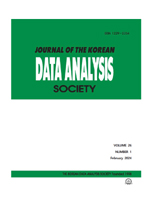1인가구의 행복에 영향을 미치는 심리사회적 요인
Psycho-social factors affecting on happiness of single-person households : focusing on the difference of life cycle
- 한국자료분석학회
- Journal of The Korean Data Analysis Society (JKDAS)
- Vol.26 No.1
-
2024.02395 - 413 (19 pages)
-
DOI : 10.37727/jkdas.2024.26.1.395
- 222

본 연구는 생애주기별 1인가구의 행복 수준과 행복에 영향을 미치는 심리사회적 요인을 검증하고자 하였다. 본 연구 자료는 한국인의 행복연구 2차년도 자료를 활용하였다. 최종분석은 1인가구로 응답한 20세 이상 성인 1,425명의 자료를 분석하였으며, 청년기, 중장년기, 노년기의 생애주기별로 다중회귀분석을 실시하였다. 본 연구의 주요 결과는 다음과 같다. 전체 1인가구의 행복수준은 보통 수준으로 나타났으며 청년기에서 노년기로 갈수록 낮아졌다. 특히 청년기에 비해 중장년기와 노년기의 행복수준이 상대적으로 낮게 나타났다. 또한 1인가구의 행복에 영향을 미치는 심리사회적 요인은 생애주기별로 다르게 나타났다. 생활수준 만족도와 미래 안정성에 대한 만족도, 우울, 사회적 지지는 모든 생애주기의 1인가구의 행복에 영향을 미치는 공통 예측요인이었다. 반면 청년기에는 안전감이, 중장년기에는 타인에 대한 신뢰, 사회적 평등 인식, 주관적 건강상태, 스트레스가, 노년기에는 자원봉사활동과 동네환경 만족도, 공동체 소속감 만족도만이 1인가구 행복에 영향을 미치는 새로운 예측 요인이었다. 이를 토대로 1인가구의 행복 증진을 위한 정책적 및 실천적 함의를 제시하였다.
This study examined the level of happiness and verified the effect of psycho-social factors on happiness of single person households by life cycle. Data from the Wave 2 of the Korean Happiness Study was used. The final sample for the analyses included data from 1,452 adults aged 20 or older who responded as a single-person household and multiple regression analyses were conducted for each life cycle of youth, middle age, and old age. The main results of this study are as follows. The happiness level of all single-person households was found to be average and decreased from youth to old age. In particular, the level of happiness in middle-aged and old age was found to be relatively low compared to youth. In addition, psychosocial factors affecting the happiness of single-person households were different by the life cycle. Satisfaction with standard of living, satisfaction with future stability, depression and social support were common predictive factors that affected the happiness of single-person households in all life cycles. On the other hand, only a sense of safety in youth, trust in others, social equality, self-rated health status, and stress in middle-aged age, and volunteer activities and satisfaction with neighborhood environment and community belonging in old age were the only new predictive factors that affected the happiness of single-person households. Based on this, policy and practical implications for improving the happiness of single-person households were suggested.
1. 서론
2. 연구방법
3. 연구결과
4. 결론 및 제언
Reference
(0)
(0)